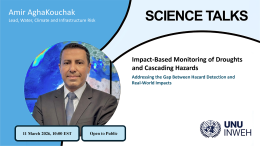Bonn, Germany — Since its inception at the United Nations University (UNU) more than ten years ago, the Sustainable Cycles (SCYCLE) programme has grown into a global leader in research and training on management strategies for electronic waste (e-waste). With the SCYCLE programme’s antecedents within UNU and beyond dating back nearly three decades, a new report — SCYCLE’s Origins and Milestones, 1994–2021 — outlines the 27-year journey of exciting research, training, and policy impact.
The report’s release also marks the SCYCLE programme’s move to the United Nations Institute for Training and Research (UNITAR), following an agreement signed between UNITAR and UNU in 2019. As of January 2022, the programme is operating as a unit of the UNITAR Division for Planet, hosted by the UNITAR Bonn office.
The SCYCLE programme’s significant success has grown from its collaborative approach. By fostering solutions-oriented dialogue, cooperation, and consensus, SCYCLE has:
- developed interdisciplinary, multistakeholder public-private partnerships;
- assisted governments in developing e-waste legislation and standards;
- offered education, training, and capacity development opportunities; and
- facilitated and disseminated practical, science-based recommendations to the United Nations system, governments, scholars, industries, and the public.
At UNITAR, the SCYCLE programme will continue to focus on the development of sustainable production, consumption, and disposal patterns for electrical and electronic equipment (EEE) as well as for related goods such as batteries, automobiles, and plastics. The programme will continue to help societies reduce the environmental load of EEE production and disposal through research and training.
A History of Success
The SCYCLE programme’s precursors date back to 1994 when UNU launched a Tokyo-based initiative to conduct research on value-added uses for waste materials that could contribute both to sustainable economic growth and to environment preservation. Five years later, in 1999, this initiative was formally organised into the UNU Zero Emissions Forum (UNU-ZEF), with an office in Japan and an international office in Germany. In 2009, UNU-ZEF ended its work after achieving its primary goal of seeing the zero emissions concept adopted by industry and governments worldwide.
From 2007–2018, UNU and the SCYCLE programme led the Solving the E-waste Problem (StEP) Initiative ― an independent, multi-stakeholder platform that supports strategic approaches towards sustainability, such as circular economy and zero waste/emissions. The StEP Initiative became a global trailblazer in pushing governments, companies, researchers, and civil society to prioritise addressing the quickly-growing e-waste challenge.
Today, SCYCLE is the recognised leader of global e-waste discussions and training, and of advancing sustainable e-waste management strategies based on lifecycle and circular thinking. SCYCLE’s E-waste Academies have become go-to training opportunities for representatives of governments, companies, and science, mobilising strengthened global cooperation. Worldwide writing, commenting, and campaigning around e-waste is rarely taken on without incorporating SCYCLE’s data and expertise. SCYCLE’s work on environmental and waste crime also assists further research to sustainably solve transnational waste shipment issues.
UNU Rector David Malone congratulated SYCLE on its transition to UNITAR:
“UNU focuses on incubation of promising new ideas and processes. As the latter mature, our institution is delighted to see them migrate to other home platforms and to benefit from a different institutional backdrop. This has worked well for a number of earlier UNU programs, and this dynamic has also stimulated UNU to keep on encouraging innovation within, rather than settling into a comfort zone.
"We are proud of SCYCLE having matured and grown so markedly in global influence and impact, and know that it will thrive in years ahead within UNITAR, a sister UN institution of ours, with which we cooperate closely.”
SCYCLE Publications
To download the latest SCYCLE programme report — SCYCLE’s Origins and Milestones, 1994–2021 — go to https://bit.ly/3qz8TnV
Flagship SCYCLE publications over the years have included three Global E-waste Monitors (2014, 2017, and 2020) that explain how the e-waste challenge fits into international efforts to achieve the SDGs, a series of Regional E-waste Monitors that analyse in greater depth the e-waste situation in specific global regions, and a number of National E-waste Monitors that provide a high level of detail for the e-waste situation of selected countries. SCYCLE’s E-waste Statistics Guidelines on classification reporting and indicators, meanwhile, are helping to improving comparability of data between countries.
For more information on past publications, visit the SCYCLE website.


